
Welcome to the 2024 November issue of Volunteer Voices, a monthly newsletter for current and potential Domestic and Sexual Violence Services (DSVS) volunteers.
In this Issue:
| Table of Contents | |
|---|---|
|
|
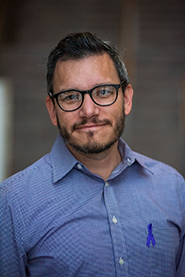 My name is Chris Davies (he/him). I’m a licensed professional counselor and marriage and family therapist. I started with Domestic and Sexual Violence Services in 2005* as an ADAPT counselor, and since then have supervised the Counseling team. I have fond memories of working closely with some of DSVS’ long-time ADAPT and Hotline volunteers over the years and hear great things about all of you. Without your support, we could accomplish only a fraction of what we do, and the commitment and compassion that motivate your services inspire trust and healing among the people you help!
My name is Chris Davies (he/him). I’m a licensed professional counselor and marriage and family therapist. I started with Domestic and Sexual Violence Services in 2005* as an ADAPT counselor, and since then have supervised the Counseling team. I have fond memories of working closely with some of DSVS’ long-time ADAPT and Hotline volunteers over the years and hear great things about all of you. Without your support, we could accomplish only a fraction of what we do, and the commitment and compassion that motivate your services inspire trust and healing among the people you help!
Supervising the Counseling team has been an inspiring experience for me. The counselors are uniquely specialized in treating trauma and making a big impact in just a short time during critical and pivotal moments in clients’ lives. My role on the team is to coordinate the efforts of the seven English- and Spanish-speaking counselors and interns who provide group, individual, and family counseling to survivors of domestic and sexual violence, stalking, and human trafficking and their families. I offer clinical supervision, support counselors’ professional development, coordinate training, analyze and report data on outcomes and trends, and synchronize the work of the team with that of the community and DSVS leadership toward our strategic plan.
I was led to this work when studying to be a couple’s therapist and working on research projects in family violence. I was drawn to the ADAPT program for its focus on attachment, compassion, and healing. The Counseling team does parallel work on emotional health and safety, healing from trauma, and ending and repairing harm caused by cycles of violence. Lately, I’ve been focusing on helping the Counseling team update its policies and procedures, expand the capacity to serve children and families, and develop a more diverse array of groups. Our goal is to make services more diversified and customized to welcome and benefit people who have been marginalized and overlooked in behavioral health and the movement against gender-based violence.
I’m a native to Northern Virginia. My wife and I have been married for 16 years, and we have three children. I love international cooking and so appreciate people who help me learn recipes and languages. I love outdoor recreation and music; for 14 years, I performed regularly as a singer and guitarist, and I’ve recently started working toward getting back into doing that. Wish me luck!
Chris Davies
Counseling Supervisor
*After nearly 20 years with Domestic and Sexual Violence Services, Chris started a position with the Children's Services Act program on Monday, Nov. 4, 2024.
 According to research, women are disproportionately stressed by Thanksgiving, but they aren’t the only ones. People occupying marginalized identities, immigrants, and folks navigating hectic finances might feel stressed by the holiday season, too. No worries: self-care to the rescue with these three tips!
According to research, women are disproportionately stressed by Thanksgiving, but they aren’t the only ones. People occupying marginalized identities, immigrants, and folks navigating hectic finances might feel stressed by the holiday season, too. No worries: self-care to the rescue with these three tips!
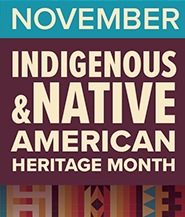 November is Native American Heritage Month. The impact of sexual and domestic violence on indigenous communities in the U.S. has a long history, reaching back to the first European colonizers who came here in the late 15th century. The effects of this violence still can be seen today, with research showing American Indian/Alaska Native women having some of the highest rates of rape of any other people. Transgender and nonbinary indigenous people have even more stark statistics: Two-thirds report experiencing sexual assault and nearly three-quarters report violence by an intimate partner. Native women and girls go missing and are murdered at the highest rate of any racial or ethnic group, often related to domestic violence and human trafficking. Find out how activists are working to change this narrative.
November is Native American Heritage Month. The impact of sexual and domestic violence on indigenous communities in the U.S. has a long history, reaching back to the first European colonizers who came here in the late 15th century. The effects of this violence still can be seen today, with research showing American Indian/Alaska Native women having some of the highest rates of rape of any other people. Transgender and nonbinary indigenous people have even more stark statistics: Two-thirds report experiencing sexual assault and nearly three-quarters report violence by an intimate partner. Native women and girls go missing and are murdered at the highest rate of any racial or ethnic group, often related to domestic violence and human trafficking. Find out how activists are working to change this narrative.
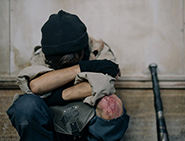 Homelessness and sexual violence are inextricably linked, especially for youth living on the street. Recent research shows young adults experiencing homelessness are as much as 35% more likely to experience sexual violence than housed youth. November is National Homeless Youth Awareness Month, observed every year since 2007 to raise awareness about children and families dealing with homelessness and to educate the public on ways to end the problem.
Homelessness and sexual violence are inextricably linked, especially for youth living on the street. Recent research shows young adults experiencing homelessness are as much as 35% more likely to experience sexual violence than housed youth. November is National Homeless Youth Awareness Month, observed every year since 2007 to raise awareness about children and families dealing with homelessness and to educate the public on ways to end the problem.
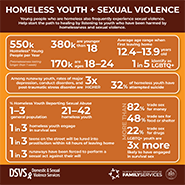 Domestic and Sexual Violence Services supports individuals, children, and families who have endured domestic violence, sexual violence, human trafficking, and stalking. Often, when parents escape violent situations, they bring their children with them, resulting in both parent and child becoming homeless and in need of safe shelter (between 22% and 57% of homelessness in the United States has been found to be the result of domestic violence). Recent research also found there are 550,000 homeless youth each year in this country, where homelessness lasted longer than 1 week; 380,000 of these young people are younger than age 18. For more insight on this epidemic, we invite you to watch Youth Homelessness Is Hidden in Plain Sight and Fighting Youth Homelessness with Community Care.
Domestic and Sexual Violence Services supports individuals, children, and families who have endured domestic violence, sexual violence, human trafficking, and stalking. Often, when parents escape violent situations, they bring their children with them, resulting in both parent and child becoming homeless and in need of safe shelter (between 22% and 57% of homelessness in the United States has been found to be the result of domestic violence). Recent research also found there are 550,000 homeless youth each year in this country, where homelessness lasted longer than 1 week; 380,000 of these young people are younger than age 18. For more insight on this epidemic, we invite you to watch Youth Homelessness Is Hidden in Plain Sight and Fighting Youth Homelessness with Community Care.
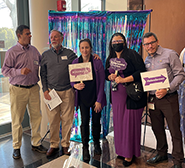 For the last 30 years, Richard Shullaw has been a Domestic and Sexual Violence Services volunteer, demonstrating exceptional dedication, remarkable skill, and a deep commitment to our mission to prevent and end domestic and sexual violence, human trafficking, and stalking. Learn more about Richard's volunteer journey.
For the last 30 years, Richard Shullaw has been a Domestic and Sexual Violence Services volunteer, demonstrating exceptional dedication, remarkable skill, and a deep commitment to our mission to prevent and end domestic and sexual violence, human trafficking, and stalking. Learn more about Richard's volunteer journey.
 “Volunteers do not just do the work; they make it work.”–Carol Pettit
“Volunteers do not just do the work; they make it work.”–Carol Pettit
Each newsletter will include this section to help share reviews, spotlight the people who support Domestic and Sexual Violence Services, recognize birthdays and list upcoming trainings and meetings.
 DVAC: It’s All About Partnership
DVAC: It’s All About Partnership
The Fairfax County Domestic Violence Action Center (DVAC) is a comprehensive, co-located service center, staffed by county agency and community non-profit partners, created to provide culturally responsive information and support services for victims of domestic and sexual violence, stalking, and human sex trafficking, and their families. DVAC also promotes the accountability of those who have caused harm through these crimes with specialized prosecution and supervision. Learn more about how these partnerships support survivors.
 Domestic and Sexual Violence Services’ podcast, Unscripted: Conversations about Sexual and Domestic Violence, is a year old this month! Stay in the know with these biweekly discussions. If you have ideas for topics you’d like to hear addressed on Unscripted, email them to DSVS’ communications specialist Kendra Lee.
Domestic and Sexual Violence Services’ podcast, Unscripted: Conversations about Sexual and Domestic Violence, is a year old this month! Stay in the know with these biweekly discussions. If you have ideas for topics you’d like to hear addressed on Unscripted, email them to DSVS’ communications specialist Kendra Lee.
Abby Picard, prevention and education coordinator with DSVS, has been with the division since January 2020—first as a hospital accompaniment specialist, and then as a human trafficking and sexual violence coordinator. She stepped into her current role earlier this year. In this position, Abby focuses on all the things a community can do to prevent violence from happening in the first place. She says she went to grad school to do exactly what she’s doing, but the words “typical day” bring a chuckle.
“A ‘typical’ day for me can look like a lot of things. Generally, working on the various projects and initiatives I and my team handle every day. Outreach and education to the community and allied professionals,” she says. “It also looks like talking to partners about what they’re seeing come up in their work. It’s reviewing DSVS’ monthly data--how many people we’re serving, calls we receive, etc. Meeting with teams about what we’re hearing from the community. It’s working on teams or workgroups I’m a part of, like, our Awareness team, which spreads awareness about the issues year-round. All of this shows up every day, but I can’t tell you when in the day things are going to happen.”


 “Blink Twice”: What to Watch When You Have Nothing Pressing to Do and Don’t Mind Being Triggered
“Blink Twice”: What to Watch When You Have Nothing Pressing to Do and Don’t Mind Being Triggered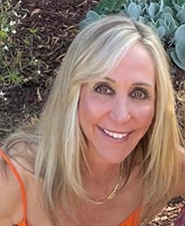 Meet Leanne Meyers, Hotline Volunteer
Meet Leanne Meyers, Hotline Volunteer
.png)


 It was all hands on deck to set up for this year’s Domestic and Sexual Violence Community Annual Meeting, and Seth Woehrle and Vic Batson (l-r) were no exception! Here, we think they were discussing food table strategy.
It was all hands on deck to set up for this year’s Domestic and Sexual Violence Community Annual Meeting, and Seth Woehrle and Vic Batson (l-r) were no exception! Here, we think they were discussing food table strategy.